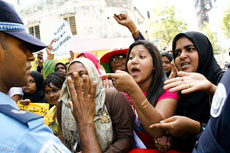The Maldivian Democratic Party (MDP) has said it will now begin working through the Majlis to achieve early presidential elections, after President Mohamed Waheed Hassan succeeded in inaugrating the parliament today.
MDP MPs heckled Waheed, preventing him from delivering the constitutionally-mandated presidential address on two occasions, claiming he had come to power through a coup d’état.
Waheed succeeded in addressing parliament only on his third attempt, amid MDP MPs continued shouts of “Traitor” and obstruction of Waheed’s face with a banner condemning him as a “Coup Boss.”
Now that Majlis has opened for the year, the MDP will work within and outside the Majlis to obtain a date for elections, MDP Spokesperson and Malé MP Imthiyaz Fahmy said.
“But I don’t think it will be possible through the Majlis,” Fahmy said. “A lot of MPs in the parliament supported the coup.”
The MDP said that it did not take pride in attempts by its MPs to obstruct the Majlis opening, but Fahmy said he felt they had been left little choice due to the party’s concerns over Waheed’s legitimacy.
“We do not take pride in such actions. But as a coup-sponsored leader, we believe his presence violates the integrity of the parliament,” Fahmy said.
Fahmy said the parliamentary group had given the Speaker the opportunity to inaugurate the Majlis, but “started protesting only when Baagee [ translated as traitor] Waheed entered Majlis.”
Fahmy also said that the MDP does not sanction violence.
Clashes nonetheless broke out between police and MDP protestors demonstrating a few streets away from the Majlis building. Over 60 were arrested. Police used tear gas and, according to some eye witness accounts, rubber bullets to disperse the crowd. Police are presently unable to confirm to Minivan News whether rubber bullets had indeed been used.
“Supporters of the current government or even police themselves may have started violence in order to attack the protestors,” Fahmy claimed.
The MDP had been organizing peaceful protests at Raalhugandu (Surf Point) for over a month. “But we haven’t been violent. We are calling for elections. Not for a violence or a coup,” Fahmy said.
The MDP alleges the controversial February 7 resignation of former president Mohamed Nasheed was a coup d’état, and has called for early general election. The Commonwealth Ministerial Action Group (CMAG) has supported the call.
Monday’s parliamentary sitting saw Speaker Abdulla Shahid deploy the Maldives National Defense Forces (MNDF) in an attempt to restore order to the chamber. Scuffles broke out between MDP MPs and MNDF personnel, and two sustained injuries, as the MNDF tried to remove protesting MPs.
In the chaotic atmosphere of today’s Majlis session, President Waheed said he would honour early elections calls backed by the MDP, as well as bodies including the EU and Commonwealth, if such as move was “required”.
Waheed pledged via a statement after giving his speech to bring together all political leaders to discuss constitutional amendments required for fresh elections.
“This is the time for all of us to work together in one spirit, the time to bring political differences to the discussion table in order to formulate solutions,” claimed the president. “I fully assure you that I will not order anyone to act against the Constitution or laws of this country”.

